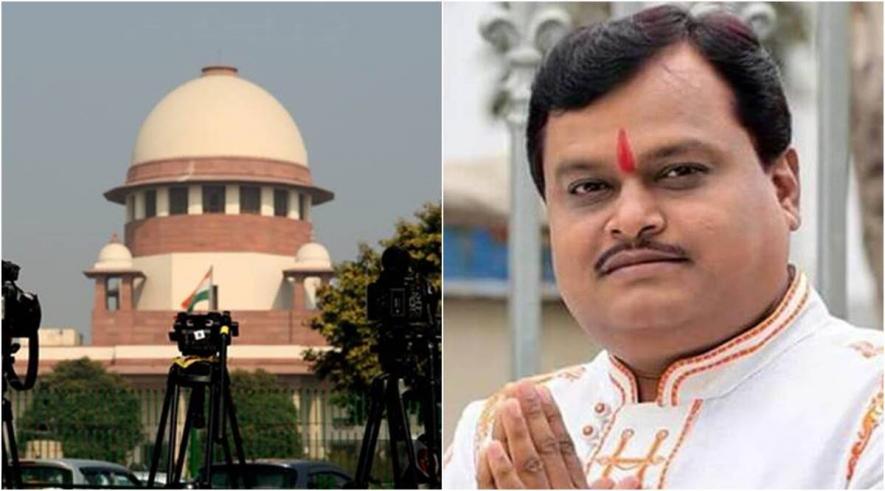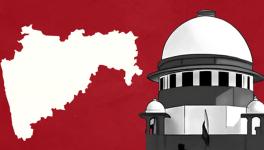Why We Are Treading Murky Waters with the Sudarshan News Cases

Image Courtesy: The Indian Express
The case of Sudarshan News being debated in the Supreme Court of India is a queer one; where a road-map is being crafted by the court for the pre-censorship of media broadcasts. Many political commentators, sociologists and legal experts have opined on the tricky field that the SC is venturing into. While most have said that the programme in contention, ‘Bindas Bol’ does not require a second opinion for condemnation as it is based on the sheer vilification of a community, is anti-constitutional and should be stopped; however, the domain of administrative law is now merging into constitutional law, which is dangerous!
In an editorial titled ‘Sorry, Your Lordship’, The Indian Express stated: “News will be weaponised by those in power when they have willing accomplices in TV studios but prior restraint, as the Supreme Court itself has repeatedly underlined, is a solution that has ramifications as disturbing as the problem it’s trying to address.”
However, before heading into territory that the SC ventured into, it would be fruitful to understand what the entire furore is all about.
The Controversy
Sudarshan News’ chairman and editor-in-chief, Suresh Chavhanke, appeared in a promo for an ‘investigation’ on a programme called ‘Bindas Bol’. The series, titled “UPSC Jihad”, was promoted and a trailer of the show was also tweeted widely by him. As the name suggests, the show was supposed to analyse the so-called ‘infiltration’ of Muslim students from Jamia Millia Islamia into the Indian bureaucracy. Aside from vilifying the Muslim community, the show attempted to paint a planned conspiracy to capture the Indian bureaucracy.
A group of former Jamia students filed a writ petition in the Delhi High Court seeking an injunction on the broadcast of the show. The High Court granted a stay on the broadcast of the controversial show and said that the Centre should take a call and disposed of the matter.
On September 9, the Ministry of Information and Broadcasting allowed the channel to telecast the show. It was not surprising as the BJP government has no problems in airing such shows that demean or vilify a minority community. A rider was attached to the permission given to the channel by the government which said that the show should not violate any programme code.
During the same period, another petition was filed in the Supreme Court by another petitioner. By the time the SC took up the matter for hearing on September 15, four episodes of the show were already broadcast by the channel between September 9 and September 14.
Sudarshan News pleaded that its freedom of speech impinged and the News Broadcasters Association said that its regulations were strong and that it would make offenders apologise. However, the SC, keeping all these arguments aside, stopped the telecast and said that the content promotes hatred.
Shadan Farasat, advocate for the three Jamia students, who also became a party to the petition in the Supreme Court, quoted from a book titled ‘How Democracies Die’ by Harvard University political scientists Steven Levitsky and Daniel Ziblatt. It said that “the institutions continue but they become hollow, similarly continuous attacks create a pervasive environment of hate speech reducing ‘me to someone’ for whom the promise of equality exists but only as a mirage.” Comparing the show to another on Rwanda radio, which had played a significant role in inciting people against the Tutsis, he said, “the nature and theme of the show was that the participation of the Muslims in the civil services was an attempt to take over the country.”
Some of the noteworthy statements by the three SC judges make for interesting reading:
“It is a matter of joy for the nation that Muslims are being selected in the UPSC exams. But you are running a show to run them down” said Justice K.M. Joseph.
“As a judge of the Constitutional Court, I have a constitutional duty to protect human dignity, which is as important as our duty to protect free speech. We respect the right of freedom but we are absolutely concerned about these kinds of attacks against a community”, opined Justice D.Y. Chandrachud.
“I saw one of the episodes and it was hurtful to watch. Many pictorials are offensive and need to be taken off,” said Justice Indu Malhotra.
The SC order on September 15 read: “India is a melting pot of civilizations, cultures, religions and languages. Any attempt to vilify a religious community must be viewed with grave disfavour by this Court as the custodian of constitutional values. Its duty to enforce constitutional values demands nothing less.”
The court categorically indicted the channel and termed the entire exercise “an insidious attempt to insinuate that the community is involved in a conspiracy to infiltrate the civil services.” It said the content of the show is not just erroneous but has been made in wanton disregard of the truth.
So far, so good. However, the debate soon entered the realm of media regulation. The SC could have easily disposed of the matter like the Delhi High Court did, based on the merit of the case, but to keep it pending with an affidavit filed by the Centre demanding a regulation of social media, has resulted in the argument being stretched.
“For the SC to consider otherwise and give this case a constitutional colour that it does not have is curious. When seen in the context of another statement in the original order that the court needs to foster ‘a debate’ on media regulation, it gives the impression of a court that is overstepping its brief,” wrote Arghya Sengupta Research Director at the Vidhi Centre for Legal Policy.
The country does need a debate on the spread of misinformation and on the massive threat to free speech. The normal narrative of television debates, which actually scuttle the entire process of a debate, also needs to be discussed. However, that forum cannot be the Supreme Court.
In one of his columns, Pratap Bhanu Mehta, Contributing Editor at The Indian Express, rightly pointed out that the issue is political and not legal. “The big lesson of the last two decades is that an over-reliance on legal instruments to solve fundamentally social and political problems often backfires. In the case of free speech, this is even more so,” he wrote.
The case of Sudarshan News is simple. It is a case of spreading hatred and hence an intervention was direly needed. But the manner in which the whole issue of free speech vis a vis spreading hatred has been juxtaposed, an equilibrium needs to be maintained.
The impending petition could have wide ramifications. The ‘state’ will try to utilise it for curbing dissent and will use it as an onslaught on liberals, democrats, communists and against all those who oppose the decisions of the central government. Take for example a call given by the trade unions for a protest against an industrialist for issues relevant to the workers. Would such a call also be qualified as spreading hatred towards an individual? Likewise, would a call by the students from a university targeting the vice-chancellor and holding a protest condemning the actions of the authorities, qualify as ‘spreading hate’ or a part of free speech?
We have already seen how after the scrapping of Article 370 and Article 35 A, major media house in J&K have been transformed into mere state gazetteers with the writ of the central government. It is because these outlets were highlighting the excesses committed by the armed forces on innocent children and people. In the guise of regulating the spread of hatred, the state did away with free speech.
In such a situation where the state is using most forms of propaganda, more regulation on ‘free speech’ would further serve the purpose of a government which is not only ‘right’ but also does not allow space for critical opposition. What needs to be done?
There has to be a debate in public discourse about what qualifies as free speech and what does not. I remember that during the process of preparation of election manifestos of various political parties, this demand was seriously raised by different groups in the media. These are the following steps that were called for to create an independent media regulation mechanism.
“Protecting individual rights and freedoms and for the review and reform of all provisions that place unreasonable restrictions constraints on freedom of speech, expression and individual rights,” the manifesto had said.
Another major issue highlighted in the manifesto, which continues to be relevant is “promoting secular, progressive and democratic culture; attacks on cultural personalities and productions by the communal forces to be firmly dealt with. Strengthening the Prasar Bharat Corporation to make it a genuine public broadcasting service for TV and radio; states to have a say in the programmes aired by the public broadcasting service. Setting up of a Media Council which can act as an independent regulatory authority for media.”
Could freedom of speech for people be the spread of hatred to the ruling discourse or vice-versa? This equilibrium can and must be maintained by the rule book, the Constitution of India, which elaborates on this. To further ponder over it through a judicial intervention could be perilous for the entire idea of ‘free speech’.
The writer is former deputy mayor of Shimla. The views are personal.
Get the latest reports & analysis with people's perspective on Protests, movements & deep analytical videos, discussions of the current affairs in your Telegram app. Subscribe to NewsClick's Telegram channel & get Real-Time updates on stories, as they get published on our website.
























